Healing Race
Talking about race isn’t always easy. Andre and Todd were college freshman roommates - one black, one white - who spent the first 25 years of knowing each other without ever discussing the topic. So they decided to go deep on the role of race and the state of race relations in the U.S... and to record their conversations so that others could see what a first conversation about race might look like, where no topic is off the table and no views are stifled or censored, but where they always listen, respect, and seek to understand - even and especially when they see things differently. And they are now welcoming guests on to experience that same kind of radical openness, honesty, and empathy. Healing Race is about having the real-deal, don’t-filter-what-you-think conversation about race, and they would love for you to join.
Episodes
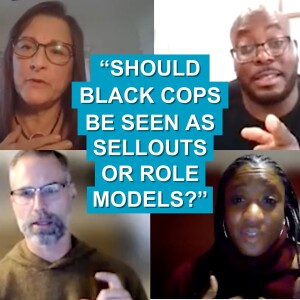
Tuesday Apr 02, 2024
Tuesday Apr 02, 2024
In this episode, our guests discuss their feelings about policing and the way that police are viewed and treated in America today. Marcus pointedly asks why he, as a black police officer, is outcast from his black community because of his choice to be a cop. Should black cops be seen as Uncle Toms and race traitors or be a source of Black pride and police reform? Are black cops a target or racialization in the same way that black civilians might?
Marcus is also asked how he balances the support and pride he feels for the police force with the racial bias or racial profiling that he also knows can exist within the force? Should police officers be held to a higher standard in how biases influence their behavior than the community members they are paid to protect? How should we understand policing and racial justice in the midst of the Black Lives Matter and Blue Lives Matter narratives? Let’s get to those conversations now. Enjoy…
To be a guest on Healing Race, email us at guests@HealingRaceShow.com
To suggest a topic for Healing Race, email us at topics@HealingRaceShow.com
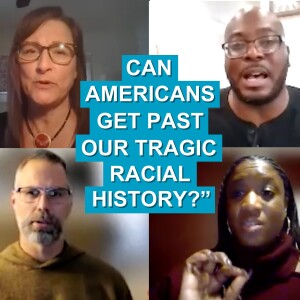
Thursday Apr 04, 2024
Thursday Apr 04, 2024
In this episode, Landon asks how we can make progress in putting our racial past behind us and focus more on our future together. Would resolving racial inequalities make a difference Are America's racial disparities still a product of racial injustice? Should economic reparations be part of the solution? What do our guests think about intensely debated ideas like affirmative action and reparations?
And is there any role for conversations like the ones we have on Healing Race that are focused on building greater understanding and healing racial divides? Susan asks how we can even have these sensitive conversations about race when there is such a strong threat of being called out, be judged as a racist, and maligned for one’s views. Let’s get to those conversations now. Enjoy
To be a guest on Healing Race, email us at guests@HealingRaceShow.com
To suggest a topic for Healing Race, email us at topics@HealingRaceShow.com
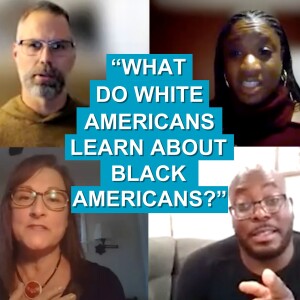
Tuesday Sep 10, 2024
Tuesday Sep 10, 2024
In this episode, Marin asks Susan how her perceptions and beliefs around race have evolved given her upbringing in a Southern community where open racial bigotry was commonplace and racial segregation was the norm.
What kind of life experiences can shape and re-shape our views about race, and how do we handle new information that contradicts what we’ve been socialized to believe about each other?
What can lead us to rely less on racial stereotypes and toward greater racial reconciliation?
Landon also shares his evolution having grown up as a Mormon in conservative Utah. How does media, popular music (like rap), and what we learn about history impact how Black Americans are viewed?
And what happens when someone like Marin doesn’t fit those racial stereotypes?
To be a guest on Healing Race, email us at guests@HealingRaceShow.com
To suggest a topic for Healing Race, email us at topics@HealingRaceShow.com
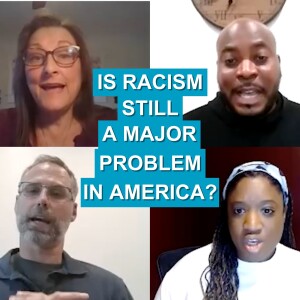
Tuesday Sep 17, 2024
Tuesday Sep 17, 2024
Our guests talk about whether it’s time to let go of thinking about race relations through the prism of our difficult racial history. Have times changed enough when it comes to the role of race in society and the impact of skin color on Americans’ lives to think differently about the way race does or does not divide us today?
Marin, Susan, Marcus and Landon also discuss the difficulty that exists in trying to offer constructive feedback to the country in a way that doesn’t come across as antagonistic toward or ungrateful for the opportunities our country provides.
Finally, they talk about the tricky terrain of Black Americans being proud of their unique history and culture when some take it as us not being proud to be Americans as well.
To be a guest on Healing Race, email us at guests@HealingRaceShow.com
To suggest a topic for Healing Race, email us at topics@HealingRaceShow.com
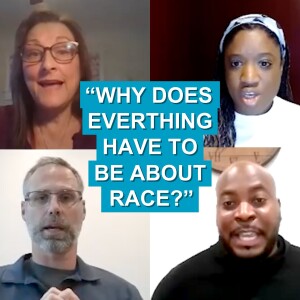
Tuesday Sep 24, 2024
Tuesday Sep 24, 2024
How can our country teach the good and the bad of our history in a way that confronts the racial challenges we've had while also highlighting the good that we've brought to our country and the world?
Can we teach our racial history in a way that isn’t watered down - covering the range of discrimination, persecution, and prejudice that has existed - but that also doesn’t create defensiveness with Americans who feel proud of what our country has accomplished?
And can using race as a way to frame our education go too far, as expressed by opponents of "critical race theory" and "anti-racism" approaches?
To be a guest on Healing Race, email us at guests@HealingRaceShow.com
To suggest a topic for Healing Race, email us at topics@HealingRaceShow.com
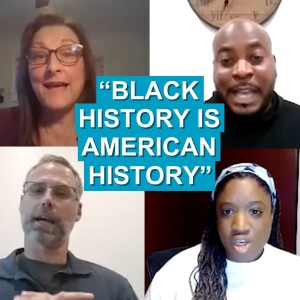
Tuesday Oct 01, 2024
Tuesday Oct 01, 2024
Our guests discuss whether early White Americans truly believed that black people weren’t fully human, or if they simply rationalized that belief to themselves to justify maintaining the institution of slavery and the power and prosperity it gave them.
Marin, Susan, Marcus and Landon also discuss if we should prioritize or minimize learning American history through a racial lens, covering the racial prejudice, discrimination and persecution that Black Americans have endured?
More generally, can we teach U.S. history in a way that captures the unique experiences and perspectives of diverse Americans but that doesn’t breed defensiveness and racial and ethnic divisions among Americans?
To be a guest on Healing Race, email us at guests@HealingRaceShow.com
To suggest a topic for Healing Race, email us at topics@HealingRaceShow.com
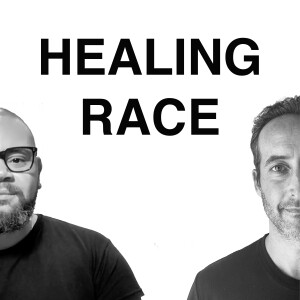
Tuesday Oct 08, 2024
Tuesday Oct 08, 2024
Is over-policing a racial issue in America? How do we resolve the long-standing problems between police and the Black community? And how does a black cop deal with these tensions?
Do police use more force against Black Americans; if so, why does it happen; and what should America do about it? Would having a more diverse police force help? Would investing more in communities plagued by crime help?
Our guests discuss these questions and also explore their views on police relations and behavior. Is the police force driven by racial profiling and racial bias, or does the media simply spin a heightened racial injustice narrative?
Is police violence toward Black Americans a product of challenges within the black community or a product of racialization of Black Americans?
To be a guest on Healing Race, email us at guests@HealingRaceShow.com
To suggest a topic for Healing Race, email us at topics@HealingRaceShow.com

Tuesday Oct 15, 2024
Tuesday Oct 15, 2024
How does a black cop deal with the tension between police and the black community? How does he view the state of the police profession, and how do tensions with American communities affect police morale?
And what are the hopes and worries of conservatives and liberals from different parts of America when it comes to police killings of black civilians and the heightened conflict between police and the black community?
Our guests share their views on police relations and behavior. Is the police force driven by racial profiling and racial bias, or does the media simply spin a heightened racial injustice narrative?
Are we destined to a cycle of crime, violence and brutality, or is there is a path that can ease tensions and improve relations?
To be a guest on Healing Race, email us at guests@HealingRaceShow.com
To suggest a topic for Healing Race, email topics@HealingRaceShow.com

Tuesday Oct 29, 2024
Tuesday Oct 29, 2024
Do racial biases still play a major role in American society? Or has “woke” culture led us to see racial biases where there is none? How do we know what’s in our minds and hearts when we judge and interact with people in our everyday lives? Do most of us carry biases about fellow Americans who are racially and politically different?
Do our racial, political & cultural biases create caution, division and animosity where there’s nothing to fear? And how do our biases about each other affect the policies that Americans support and legislators enact? Our guests talk about the biases they carry about other social groups and even about their own social groups. They also discuss the cultural differences that fuel the stereotypes that separate us and the cultural similarities that can often be overlooked.

Tuesday Nov 19, 2024
Tuesday Nov 19, 2024
Is success in America driven more by hard work or circumstances? Do racial biases still play a major role in economic inequalities? Or has “woke” culture led us to see racial biases and racial inequities where there are none (or at least relatively few)?
Is their a victimhood culture in Black and poor America, or do some Americans really have a leg up when it comes to how they are supported to succeed? And have White Americans, in particular white men, been blocked from success with policies like affirmative action and DEI (diversity, equity and inclusion)?
Our guests talk about whether the U.S. is truly a meritocracy, or if factors such as race, class and geography strongly influence the outcomes of most Americans. They also discuss whether the push for greater diversity in companies, schools and governments has put white men at a disadvantage and has led to the political backlash we see in American society today.





